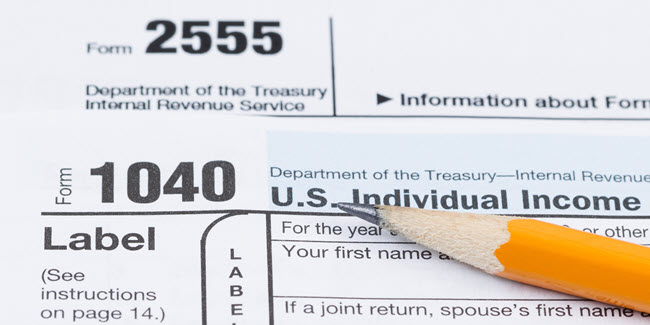Form 2555: Excluding Foreign Income
5 min read
April 10, 2023
April 10, 2023
At a glance
Want to exclude foreign income from your U.S. taxes? You’ll file form 2555, the foreign earned income exclusion, in order to do it. Learn more with H&R Block.

Form 2555 is one of the tax forms you’ll want to get familiar with if you’re an American working and living overseas. It’s the form you file to claim the Foreign Earned Income Exclusion, which (if you qualify for it) can save you a lot of headaches and a lot of money come tax season. Below, we’ll dive into the basics of Form 2555, including why it exists, who files it, and a quick run-through of how to do it.
Between all the different acronyms and form numbers, taxes as an expat can be confusing—that’s why we’re here to guide you through the process! Taxes are tricky and filing the wrong form can lead to all sorts of trouble. Start with H&R Block today and we’ll make sure your taxes are done right. No matter where in the world you are, we’ve got a tax solution for you — whether you want to DIY your expat taxes or file with help from an advisor.
What is Form 2555 used for?
Form 2555 is the form you file to claim the Foreign Earned Income Exclusion, which allows you to exclude up to $120,000 of foreign earned income for the 2023/2024 tax year.
The Foreign Earned Income Exclusion exists the help prevent double-taxation. Most countries implement some sort of tax on income earned within their borders. The U.S. is the same way. What’s different about the U.S., though, is that the U.S. taxes income based on citizenship and residency — meaning you still have to pay taxes on foreign income you earned abroad.
To help protect Americans earning income abroad from being double-taxed (once by the U.S. and once by the country in which they earned the income), the U.S. government created foreign tax credits, deductions, and exclusions qualifying expats can claim. Tax form 2555 is the form you use to figure out and claim the foreign earned income exclusion and housing exclusion or deduction.
If you’re unsure if you should file Form 2555 to claim the foreign income exclusion or Form 1116 to claim the Foreign Tax Credit, let us help. No matter where in the world you are, we’ve got a tax solution for you — whether you want to DIY your expat taxes or file with help from an advisor.
Form 2555 vs. Form 1116
Many expats have a choice between using Form 2555 to claim the Foreign Earned Income Exclusion and using form 1116 to claim the Foreign Tax Credit. Big factors U.S. expats should consider when choosing between the FEIE or the FTC include:
- Your income type and source
- Your housing expenses
- Your future plans for life and work abroad
- Your dependents and their U.S. citizen status
- Whether you pass the Bona Fide Residency test or the Physical Presence Test
- Your current country of residence and its local tax laws
- Your foreign tax liability to your country of residence
It is possible to use the credit and the exclusion together to get the best outcome. Leave it to one of our Tax Advisors to do a deep dive into your information and figure out which option would be best for you.
Who needs to file Form 2555?
You need to file IRS form 2555 if you want to claim the Foreign Earned Income Exclusion. The FEIE is available to expats who either:
- Work outside the U.S. as employees, whether for a U.S. or non-U.S. employer
- Work outside the U.S in a self-employed or partner capacity
- Pass either the Bona Fide Residency Test or the Physical Presence Test
You should note that employees of the U.S. government can’t claim the foreign income exclusion. However, an employee of a private company under contract with the U.S. government might still be eligible.
Form 2555 and the Bona Fide Residency Test
If you choose to claim the FEIE over the FTC and want to qualify for the FEIE using the Bona Fide Residence Test you must:
- Prove you have more ties to the foreign country than the U.S.
- Prove you have been a resident of that country for an uninterrupted tax year
- Be a U.S. citizen or be a resident alien of a foreign country with which the U.S. has an income tax treaty.
- Earn active income. Unearned, or inactive, income like pension payouts, interest, and dividends cannot be included.
- Be overseas for work for a period longer than a year.
- Have a permanent place of work in a foreign country.
It is possible to be a Bona Fide Resident for part of the year if you spent at least a full tax year outside the U.S. in a prior year. As a result, you can file Form 2555 for part of the year.
Form 2555 and the Physical Presence Test
If you want to qualify using Physical Presence Test, you must prove you’ve been living outside the U.S. for 330 full days out of the year. You should note that a “full day” counts as 24 hours starting at midnight, and you need to be in-country for every minute of those 24 hours.
For example, if you lived in Baja California, popped over the border to San Diego Friday night and came back Saturday evening, you wouldn’t be able to count that time towards your 330 full days.
Form 2555 instructions
Your Form 2555 instructions can be found on the IRS’ website, but because making a mistake can cost you (literally), we recommend you leave it to a seasoned tax pro to do all this work for you.
Need help with Form 2555, the Foreign Earned Income Exclusion? Trust the tax experts at H&R Block
Taxes aren’t simple, and that’s why we at H&R Block work round the clock to do them for you. Whether you file expat taxes yourself with our online DIY expat tax service designed specifically for U.S. citizens abroad or file with an advisor, H&R Block is here to help. Start your expat taxes today!
Was this article helpful?
Recommended articles
See what expats have to say about their experience with us.

No one offers more ways to get tax help than H&R Block.
Easy online filing designed for expats. Experienced experts if you need them. Get your taxes done in the way that’s right
for you.









